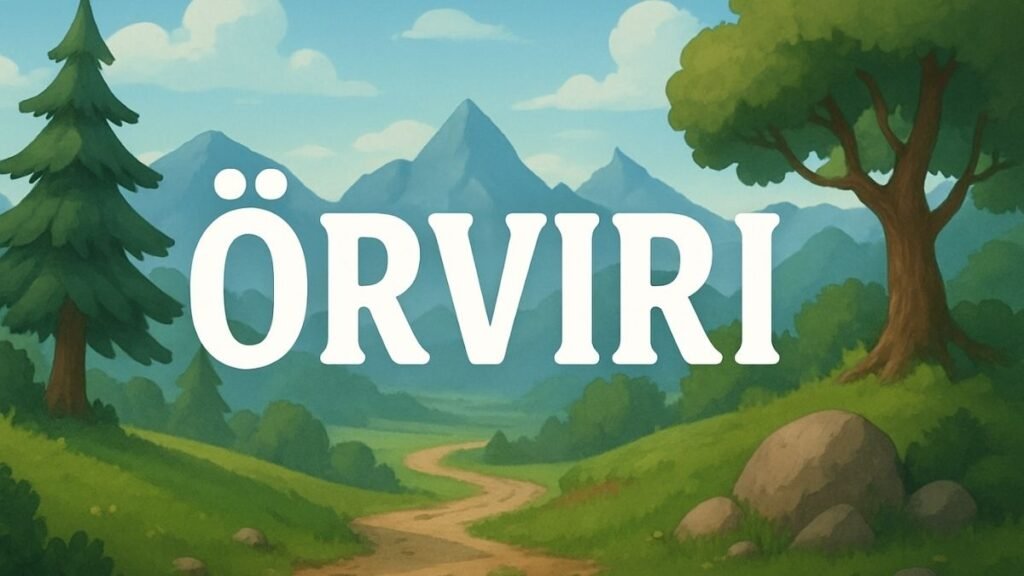Introduction
Every once in a while, a word captures the attention of the internet and sparks endless curiosity. One such word is örviri. Over the past few months, more and more people have been typing “google örviri” into their search bars, trying to uncover its meaning. Is it a hidden cultural reference, a linguistic puzzle, or just a trending internet mystery?
This article takes a deep dive into örviri and its possible origins, uses, and why it has become a hot search topic.
Table of Contents
What is Örviri?
At its core, örviri is a term that appears mysterious because it does not belong to common English vocabulary. The word feels foreign, possibly tied to Nordic, Scandinavian, or Icelandic linguistic roots. For many people encountering it online, the meaning is unclear, which only fuels more interest.
Simply put, örviri can be seen as:
- A unique linguistic term that sparks curiosity.
- A cultural or symbolic word whose meaning may vary depending on interpretation.
- An internet trend, driven by people searching for unusual or rare words.
Possible Origins and Meanings of Örviri
Since örviri is not part of mainstream dictionaries, its origins are somewhat obscure. However, language enthusiasts and online discussions suggest a few possibilities:
1. Linguistic Roots
The use of “ö” hints at a word borrowed from languages like Icelandic, Swedish, or Finnish. Words in these languages often contain special characters that add to their distinctiveness.
2. Symbolic Interpretation
Some readers interpret örviri as a symbolic or metaphorical term. It could represent mystery, hidden knowledge, or something rare and precious.
3. Modern Online Term
In today’s world, even random words can trend once they gain momentum through search engines and blogs. Örviri may be one such example, where the mystery itself becomes the meaning.
Why is Örviri Trending?
The reason people are suddenly searching “google örviri” lies in three main factors:
- Curiosity: The word looks unusual, so people naturally want to know what it means.
- Global Exposure: Mentions in blogs, articles, and social media have amplified searches.
- Search Engine Cycle: As more people search for it, Google keeps showing it to more users, creating a loop of curiosity.
The Fascination with “Google Örviri”
When users type google örviri, they are not only searching for a definition but also joining a global conversation. This behavior reflects an interesting trend:
- People don’t just want meaning, they want stories, history, and context.
- They hope to find whether örviri is linked to culture, mythology, or language.
- Some are simply drawn to the mystery factor—the thrill of discovering something hidden.
Örviri as a Cultural or Symbolic Term
Even if its exact definition is debated, örviri can be understood through a cultural lens. Many mysterious words throughout history—like “serendipity” in English or “hygge” in Danish—carry deeper meanings beyond direct translation.
Örviri might be viewed as:
- A representation of hidden beauty.
- A metaphor for mystery or enigma.
- A cultural marker that sparks discussion and exploration.
Why Words Like Örviri Matter in the Digital Age
In today’s interconnected world, even a single word can ignite global curiosity. The rise of örviri reflects:
- Linguistic diversity: Exposure to rare words reminds us of the richness of global languages.
- Human curiosity: We are naturally drawn to the unknown.
- Digital amplification: Once a term appears online, search engines can spread it worldwide in days.
Örviri, whether rooted in culture or not, shows how language can unite people in collective curiosity.
Safety in Searching Rare Terms
One important aspect of exploring trending words is safety. When you search terms like örviri online, always be cautious:
– Stick to trustworthy websites.
– Avoid clicking on suspicious links that promise “hidden meanings” but redirect to spam.
– Remember that curiosity should be paired with critical thinking.
FAQs About Örviri
Q1: What does örviri mean?
Örviri is a mysterious word with debated origins, possibly linked to Scandinavian languages, culture, or symbolic interpretations.
Q2: Why do people search for “google örviri”?
Because the term is trending, people search it on Google to uncover its meaning, origins, and cultural significance.
Q3: Is örviri a real word?
Yes, it appears to be a word from certain linguistic roots, but its popular use today is more about curiosity than dictionary definition.
Q4: Is there one correct meaning of örviri?
Not really. Its meaning can be symbolic, cultural, or simply an internet trend depending on context.
Conclusion
The rise of örviri shows how powerful words can be in the digital world. Even without a fixed meaning, the mystery surrounding it is what makes it fascinating. For some, örviri may be a linguistic gem; for others, it’s simply a symbol of curiosity and hidden beauty.
So the next time you come across google örviri, remember that sometimes the journey to uncover meaning is more valuable than the definition itself.

